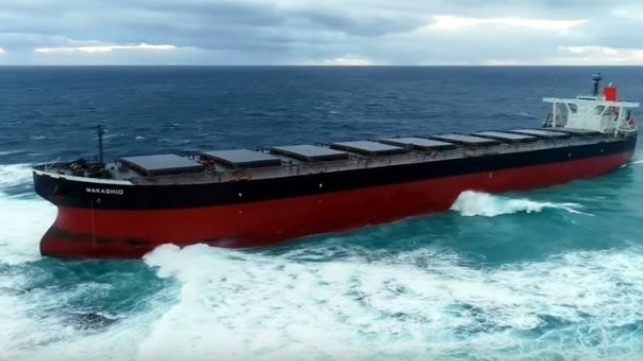Wakashio, a Japanese bulk carrier that ran aground on a reef off the coast of Mauritius in late July, has split in two on 15 August.
There is now a distance of around 30 metres between the two parts of the ship’s hull on the coral reef off Pointe d’Esny, Alain Donat, director of maritime affairs was cited by Le Mauricien as saying.
The detached part was planned to be towed away and sunk, however, heavy weather has delayed the implementation of the towing plan.
“A crack in the cargo hold No. 8 to the stern side had progressed which has caused the vessel to break. The vessel is being continously assessed by a team of industry experts … who are closely monitoring and assessing the vessel. The professional team of salvors will focus on the safe and environmentally sound removal of the vessel from the reef,” Japanese shipping company Nagashiki Shipping, the owner of the vessel, said in a statement.
The ship had approximately 3,800 tonnes of very low sulphur fuel oil (VLSFO) on board and 200 tonnes of diesel oil when it grounded on 25 July. At least 1,000 tonnes of fuel is believed to have leaked into the ocean.
“Approximately all quantity (Estimated around 3,000MT) of bunker oil remaining onboard, except for the 1,000MT which had leaked out has been recovered from the vessel and transferred to small tankers by August 12,” Nagashiki Shipping informed.
“Most of the lubricant oil and residual oil onboard (approximately 100MT) has been collected by August 14. An amount of unrecovered oil is believed to have leaked out of the vessel.”
Nagashiki added that an oil fence has been installed around the ship and the spilled oil is being collected by adsorbents.
“With more than 3,300 of the 4,000 tonnes of oil from the ship’s fuel reservoirs being pumped out, it can be said that the worse is behind us and from now on everything will be put in place to ensure that our lagoons are safe as well as secure and government acknowledges that this process will take a long time,” Steven Obeegadoo, Deputy Prime Minister of Mauritius, said in a separate statement.
According to the owner of Wakashio, the ship’s crew is being investigated by the authorities to help determine the cause of the incident. Unconfirmed reports are suggesting that the crew was celebrating a crewmember’s birthday and approached the Mauritius coastline as they were searching for a wifi signal.
Earlier this month, Mauritius’ Prime Minister, Pravind Jugnauth declared a “state of environmental emergency” after the ship began spilling oil.
The grounding occurred in an environmentally sensitive area, near to a marine park and wetland sites of international importance. It is also a popular tourist destination. Early salvage efforts were hampered by sea conditions at the reef, combined with the logistical challenges of getting equipment and personnel to site under COVID-19 restrictions. After Mauritius requested international support to respond to the crisis, several countries sent help to tackle the oil spill.
Yesterday, India has sent a ten-member specialist pollution response team to contain the oil spill, with 30 tonnes of specialized equipment for this purpose.
Greenpeace sends open letter to Nagashiki, MOL
On 13 August, Greenpeace Africa published an open letter addressed to officials from Nagashiki Shipping and Mitsui O.S.K. Lines (MOL) — the vessel’s charterer — demanding answers to “many unanswered questions” regarding the Wakashio catastrophe.
“Thousands of local people are battling night and day to try to contain the damage your ship is causing to their homelands and livelihoods. Furthermore, the world is watching, and we are watching. Despite the seriousness of the situation, your experts only arrived nearly 3 full weeks after the ship first ran aground on July 25,” Greenpeace Africa pointed out in the letter.
The non-governmental environmental organisation also demanded from the Japanese shipping companies to fully implement the Polluter Pays Principle; initiate and fund a fully public independent investigation; commit to stop using this route and to stop using fossil fuels as soon as possible.
Offshore Energy

